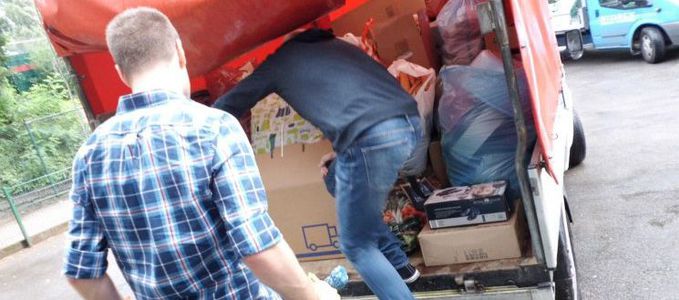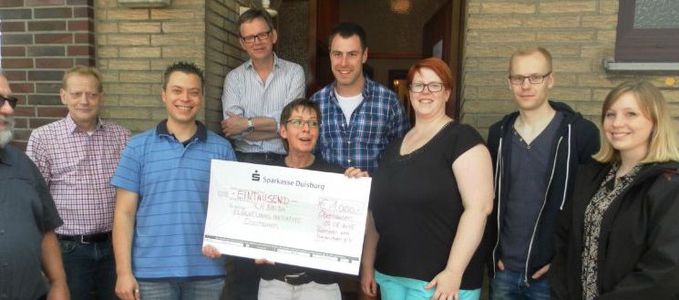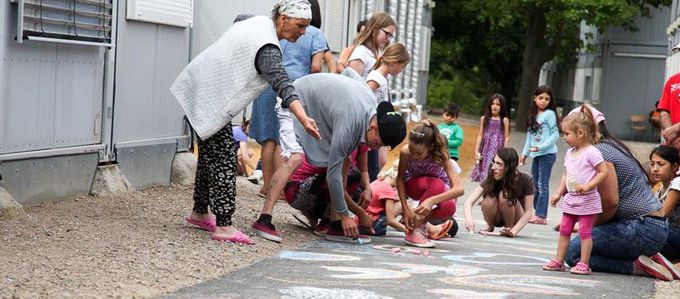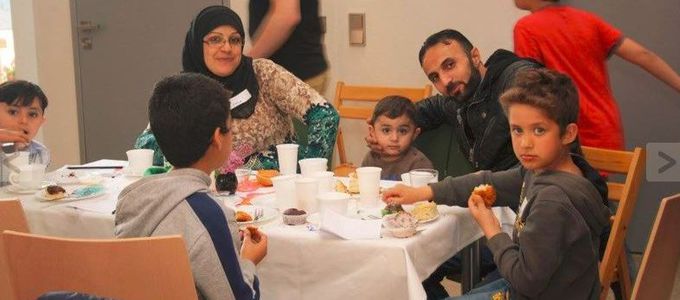
Helping hand in hand: that is how New Apostolic congregations have been helping refugees for months—most often together with other Christians, initiatives, and organizations. Infrastructural support is also coming increasingly from the Church leadership.
Daniela Plugge from Hagen in Northern Germany and Torsten Hausdorf from Lauchhammer in Eastern Germany have three things in common: both are New Apostolic Christians, both are involved in refugee aid, and both have recently begun working in an official capacity in this effort. She works on the state level, and he works from the side of the Church.
Two helpers among many
Daniela Plugge is the integration officer of her hometown. Torsten Hausdorf is responsible for refugee aid in the District Church of Berlin-Brandenburg. The Evangelist’s commitment began as a result of personal contact with refugees. For the mother of three, it was the deadly accidents on the Mediterranean that triggered her volunteer activity.
These are only two of many members who are putting Christian love into practice: many more, such as the young people from Charlottenburg or the members in Bergheim, are helping along with transportation and distribution of aid materials. Others are busy collecting donated goods such as groceries (Herzogenrath), household wares (Oberhausen), hygiene products (Bremen), and especially clothing (Calden, Trier).
Fundraising as a team
There are benefit markets in many places, from Dortmund to Wössingen to Berghausen, Karlsruhe, and Hohenlimburg. Also popular are charity concerts such as those that have already taken place in Breckerfeld and Münster, and those still scheduled to take place later this fall right across the Republic, for example in Baunatal, Heidelberg, and Marburg.
The donations collected by way of these efforts most often make their way to relief agencies such as the Catholic Caritas, the Protestant Diakonie, or other organizations such as Amnesty International or the Bundesverband Pro Humanitate. Such cooperation is also popular in local congregational work groups such as those in Eberbach, Heimsheim, Kempten, Leonberg, Lippoldsweiler, Unterbrüde, and Weissach am Tal.
Personal contact is important too
Personal contact is at least as valuable as material and practical support. There are examples of this in Weimar (games and crafts afternoon) and Neckarsteinach (culinary exchange evening). This even includes a retired couple, both former teachers, who agreed to sponsor a 19-year-old refugee.
Just as the members are a mirror for society’s willingness to help, the other side of the coin can also be seen here: fear of foreigners and concern over one’s personal well-being. This too is a popular topic in faith-oriented discussions on the various social networks.
District Churches set examples
Chief Apostle Jean-Luc Schneider has already made clear on several occasions just how contrary such xenophobia is to the Christian faith — for example, at the most recent divine service he conducted in Luxemburg. “We cannot serve God and despise our neighbour! Our neighbour is also the stranger!” This sentiment has also been clearly expressed in letters written to the congregations by the various District Apostles, such as Rainer Storck (“Let us stand up against all forms of xenophobia.”), Rüdiger Krause (“Do not participate in xenophobic conversations.”), and Wilfried Klinger (“Oppose discriminatory slogans.”).
The District Churches themselves have also set some benchmarks of solidarity with the refugees: for example, Berlin-Brandenburg plans to donate a considerable portion of its Thanksgiving Day offering. Southern Germany has declared refugee aid as the focus of all 2015 fundraising for its Hilfswerk organization, and has allocated a donation to each Church district that needs it. And beyond that, the District Churches of Northern Germany, Berlin-Brandenburg, and North Rhine-Westphalia have made former churches available to the authorities for their use.
One thing is very important to the Church leaders: this refugee aid is not to serve the purposes of missionizing. The focus is on practising charity. That is also how the many helpers in the congregations, such as Luisa Helmeke, one of the young people from Charlottenburg, see it, “By giving up just a little, we can help people who have had to give up everything in order to save their own and their children’s lives.”











